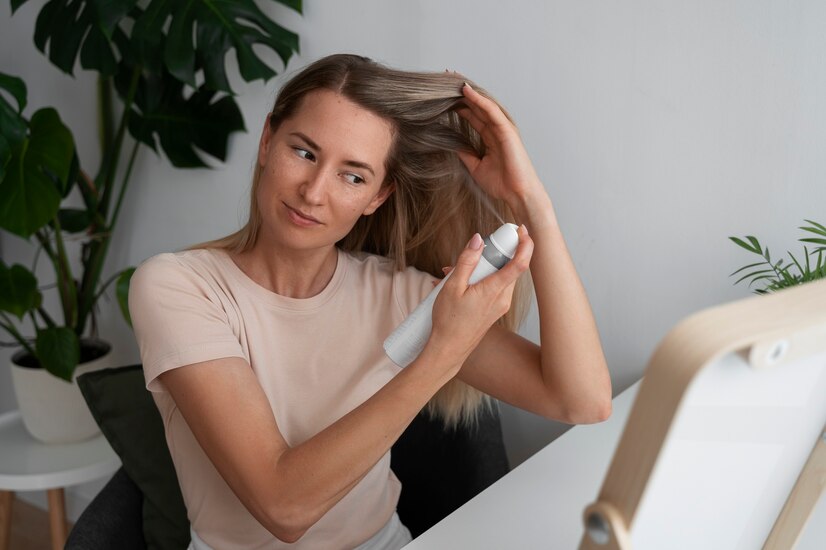Ever noticed more hair strands clogging up the shower drain or left behind on your brush than usual? If so, you’re not alone. Hair loss can be a pesky problem, and finding the root cause can feel like finding a needle in a haystack. Amid the vast world of remedies, one word seems to be on everyone’s lips these days: collagen.
But can collagen help against hair loss? And if so, how? Is this just another wellness fad, or is there real science backing it up? Let’s dive deep into the world of collagen, uncover the relationship between collagen supplements and hair health, and explore whether this protein powerhouse could hold the key to luscious locks.
Understanding Hair Loss
Before delving into collagen’s role, it’s crucial to understand what leads to hair loss in the first place. Here are some common culprits:
Common Causes of Hair Loss
- Genetics: Hereditary-pattern baldness, also known as androgenetic alopecia, is the most prevalent form of hair loss.
- Hormonal Changes: Pregnancy, childbirth, menopause, and thyroid issues can cause temporary or permanent hair loss.
- Medical Conditions: Scalp infections, alopecia areata, and diseases like lupus.
- Medications and Supplements: Drugs used for cancer, arthritis, depression, and heart problems.
- Stress: Physical or emotional shock can trigger hair shedding.
- Dietary Deficiencies: Lack of vitamins, minerals, and proteins can impair hair growth.
- Styling Habits: Excessive heat, chemical treatments, and tight hairstyles.
What Is Collagen?
Collagen is the most abundant protein in our bodies, making up around 30% of total protein content. It’s the main component of connective tissues like skin, tendons, ligaments, and muscles.
Types of Collagen
There are several types of collagen, but the primary ones include:
- Type I: Found in skin, tendons, bones, and ligaments.
- Type II: Makes up cartilage.
- Type III: Found alongside Type I in skin, muscles, and blood vessels.
- Type IV: In basement membranes, supporting cell layers.
How Does Collagen Support Hair Health?
The Connection Between Collagen and Hair
- Keratin Production: Hair is primarily made up of a protein called keratin. Collagen contains amino acids like proline, lysine, and glycine, which are vital for keratin synthesis.
- Antioxidant Properties: Collagen fights free radicals that can damage hair follicles and lead to hair thinning.
- Scalp Health: Collagen supports skin elasticity and hydration, which can improve the condition of the scalp, creating a better environment for hair growth.
- Prevention of Hair Follicle Damage: Collagen helps to strengthen hair follicles, reducing hair breakage.
Research Insights
Studies on collagen’s direct impact on hair loss are still emerging, but some promising findings indicate its benefits:
- A 2016 Study found that collagen supplementation helped improve skin elasticity and hydration, which are essential for scalp health.
- A 2017 Review indicated that collagen peptides could protect against oxidative stress, indirectly benefiting hair growth.
- A 2021 Study showed that Type I collagen production decreases with age, which may contribute to hair thinning and loss.
Can Collagen Help Against Hair Loss? How to Incorporate Collagen for Healthy Hair
1. Oral Collagen Supplements
The most common way to boost your collagen intake is through oral supplements. Hydrolyzed collagen peptides are easily digestible and absorbed by the body.
Benefits:
- Convenient
- Can target multiple areas like skin, nails, and joints
- Easy to find and add to your diet
Forms Available:
- Powder
- Capsules
- Liquid
Recommended Dosage: Typically, 2.5 to 10 grams per day, but always consult a healthcare professional.
2. Collagen-Rich Foods
Collagen is naturally present in many foods:
- Bone Broth: Rich in gelatin and amino acids.
- Chicken and Fish Skin: Great sources of Type I collagen.
- Eggs: The membrane contains collagen.
- Gelatin: An excellent source, though less concentrated than hydrolyzed supplements.
3. Topical Collagen Treatments
Some hair products claim to contain collagen that can be absorbed topically.
Types:
- Shampoos and conditioners
- Serums
- Masks
Effectiveness: While they may improve scalp health and hair appearance, their absorption into the skin is limited.
4. Lifestyle Modifications
Beyond collagen supplements, a few lifestyle tweaks can support hair growth:
- Balanced Diet: Foods rich in vitamin C, zinc, copper, and sulfur are essential for collagen synthesis.
- Adequate Sleep: Sleep is critical for hormone regulation and cellular repair.
- Stress Management: Try yoga, meditation, or deep breathing exercises.
FAQs About Collagen and Hair Loss
Q1: How long does it take for collagen to show results for hair growth?
A: Visible improvements in hair health may take 4-12 weeks of consistent collagen supplementation.
Q2: Are there any side effects of taking collagen supplements?
A: Collagen is generally safe, but some may experience digestive issues or allergic reactions.
Q3: Can I take collagen with other hair supplements?
A: Yes, combining collagen with biotin or keratin supplements may enhance results. Always consult a healthcare provider.
Q4: Is marine collagen better than bovine collagen for hair loss?
A: Both types are effective. Marine collagen has smaller particles, which may offer better absorption, while bovine collagen is more readily available.
Q5: Does collagen promote hair regrowth in those with genetic hair loss?
A: While collagen may improve hair quality and slow thinning, it may not entirely reverse hereditary hair loss.
Conclusion
So, can collagen help against hair loss? The answer isn’t black and white, but incorporating collagen into your hair health regimen shows promise. While it’s not a magic bullet that will reverse hereditary baldness, its amino acid profile and antioxidant properties can undoubtedly boost overall hair quality and scalp health.
From bone broth and supplements to a holistic lifestyle approach, integrating collagen into your daily routine might just help you win the fight against hair loss. In the end, it’s worth a shot, especially if it means healthier hair, glowing skin, and stronger nails.



